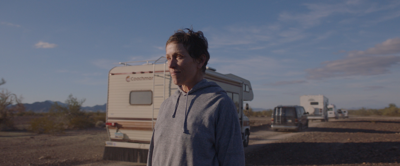
It’s easy to miss things in a pandemic — a vacation spot, your favorite dish from a restaurant that has temporarily closed, overpriced hot dogs at a ball game, seeing a movie you know you’ll love forever on the silver screen. They’re things we take for granted. Take that feeling, multiply it by a thousand, and that’s what it feels like not to be near the people you love in a time of crisis. Living through the isolating hell of COVID-19 has been numbing but edifying. We’re all a bit listless, cobbling together new, strange experiences out of the remnants of our old lives.
Filmmaker Chloé Zhao has spent her last two films — movies that have catapulted her to sought-after status in Hollywood in a short amount of time — mourning the things and people we lose when life changes and we have to find a new path forward. She has found a kinship with the struggles of the American West, a land once replete with golden possibility.
In 2018’s stunning The Rider, Zhao depicts a cowboy having to hang up the saddle for the sake of his health, unsure of what life will look like moving forward. With Nomadland (coming to Hulu on Friday), Zhao studies one woman (Frances McDormand) as the representation of a fractured nation in the wake of economic devastation. She's also living through a universal experience, trying to cope with loss and what it means to wander anew. Nomadland was made before COVID-19 hit, but it works as an analogy for what we've all experienced over the past year, slogging through an uncertain, dreary time.
McDormand’s Fern has lost her husband and her job in economically distressed Empire, Nev., and it’s sparked an irreversible change in her. She’s sold all of her belongings and has decided to wander across the West in a van. Zhao taps into what filmmakers like the Coen brothers and Martin McDonagh have found in McDormand: Her steely resolve, quick wit and undeniable depth make her a perfect vessel for Fern’s lament. As she goes through the ups and downs of nomadic living, Fern is full of both optimistic curiosity for a new life and the crushing weight of what she carries with her. Certain passersby interweave their stories with hers — a dying woman (the mononymic Swankie as herself, a true original) shares her life’s story, a kindred nomad (David Strathairn) gently tries to court Fern at various stops, and a hallowed nomad (Bob Wells) unearths the grander realities at play for those who choose this style of living.
All along, Zhao finds nothing but beauty and aching in Fern’s story. She’s here because the system that's supposed to serve everyone in a nation as prosperous as the United States failed her, and because the cycle of life is unforgiving. Likewise, we’ve found ourselves gripped by a pandemic caused by Mother Nature's fickle patterns and worsened by humans' systemic failures.
Fern seems unable to settle as she processes the trauma of her past throughout the film, but it’s never without hope for better times ahead. The grand empathy of Zhao’s vision finds a world where nomads won’t wander forever, and where no goodbye is permanent. Nomadland posits a key tenet of the nomad: What we once loved is never really gone, and we’ll find it down the path eventually. It might not be the same as it once was, but it’ll return to us one day.
Roger Ebert's line about film being a machine that generates empathy is referenced frequently, but that’s because it’s one of the truest lines ever written about the medium. Zhao’s film, however accidental, is the empathy machine we need to get us through the pandemic. For that, it will live eternal.





